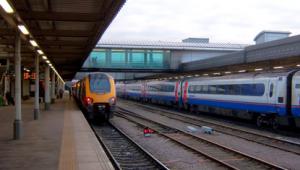By Richard Johnstone | 16 April 2014
The total government subsidy of the railways has fallen to £4bn, with no net support being provided to train operators across Britain, according to figures published by the industry regulator today.
The Office for Rail Regulation said that in 2012/13, £1.9bn of subsidies were paid to train operators across the country to support services as part of the government’s franchise system. However this was matched by £1.9bn in payments from those operators that pay a premium for the right to operate services. This meant that net public sector support was made up of the £4bn network grant provided to government-owned Network Rail to maintain and upgrade the tracks across the country.
As a result, total government funding is down 4.2% compared to 2011/12, and by 9.1% from 2010/11.
Of the £4bn total support, the majority – £2.8bn – comes from the Department for Transport, while Transport Scotland provides £700m. The remainder is made up of £200m from regional Passenger Transport Executives, and £100m from both Transport for London and the Welsh Government.
However, the report found that significant variations remained in the level of government funding between England, Scotland and Wales. Total funding varied from £2.19 per passenger journey in England, to £7.60 per journey in Scotland, and £9.33 per journey in Wales.
The total cost of rail industry operations was £12.3bn in 2012/13. Although this amount has remained consistent over the past three years, it has fallen by 6.2% over the last two financial years when calculated as a cost per passenger kilometres travelled, due to rising levels of use.
ORR chief executive Richard Price said the industry received substantial income from both taxpayers and passengers, with ticket sales raising £7.7bn. The report was a step forward in the industry’s transparency in demonstrating where this money goes, he added.
‘Passengers are increasingly the main funder of the railways, and must be central to developing its plans for the future.
‘ORR is working to put passengers at the heart of the railways – working with the industry to ensure passenger groups have a greater say in plans and delivery of new enhancements to the rail network; to review the quality of information provided to passengers during the recent disruptions; and to establish a code of practice on rail ticket selling.’




















